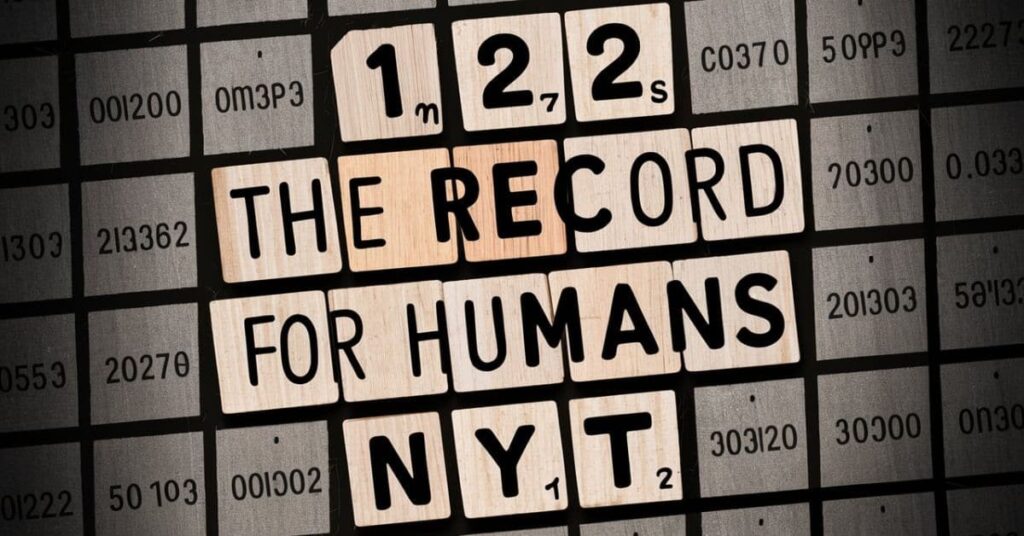122 Is the Record for Humans NYT: Understanding the Puzzle and Its Fascination

The phrase “122 is the record for humans NYT” is a cryptic expression that has caught the attention of crossword enthusiasts, trivia lovers, and curious minds alike. This phrase, rooted in the realm of puzzles, particularly the New York Times Crossword, has sparked interest and debate, leading many to ponder its significance and the story behind it.
This article delves into the meaning behind “122 is the record for humans NYT,” exploring the origins, interpretations, and the broader cultural impact. We’ll also examine why this puzzle has resonated with so many people and how it fits into the larger context of human achievement and record-setting.
The Mystery Behind “122 Is the Record for Humans NYT”
The phrase “122 is the record for humans NYT” refers to a particular clue found in the New York Times Crossword puzzle. Crossword puzzles, especially those published by the New York Times, are known for their clever wordplay, challenging clues, and sometimes obscure references. This specific clue, however, stands out because it doesn’t just challenge the solver’s vocabulary or general knowledge but also taps into a historical and record-breaking event.
The number 122 refers to the age of Jeanne Calment, a French woman who holds the record for the oldest confirmed human lifespan. Jeanne Calment lived to be 122 years and 164 days old, making her the longest-lived human in recorded history. This remarkable feat has been a topic of fascination and study, not just for gerontologists but also for the general public.
When the New York Times Crossword puzzle used “122 is the record for humans” as a clue, it was referencing this incredible human achievement. However, the clue also plays into the puzzle’s nature by being slightly vague, forcing solvers to think critically and connect the dots between the number 122 and human longevity.
Jeanne Calment: The Woman Behind the Number
Jeanne Calment was born on February 21, 1875, in Arles, France, and passed away on August 4, 1997. Her life spanned three centuries, witnessing profound changes in the world. From the invention of the airplane to the rise of the internet, Calment saw it all. Her longevity has been attributed to a combination of genetics, lifestyle, and perhaps a bit of luck.
Calment’s record has been meticulously verified by researchers, making her the benchmark for human lifespan. Her story is not just about longevity but also about the quality of life she maintained well into her later years. She was known for her sharp wit, sense of humor, and active lifestyle, even engaging in activities like fencing at the age of 85.
The Significance of 122 in the New York Times Crossword
Crossword puzzles often use numbers in a metaphorical or symbolic sense. The number 122, when linked with the phrase “is the record for humans,” immediately draws the solver’s attention to the concept of human limits, achievements, and the quest for understanding longevity. The New York Times Crossword, in particular, is known for weaving in cultural references, historical facts, and records into its clues, making each puzzle a miniature lesson in various subjects.
The inclusion of 122 in a crossword puzzle serves multiple purposes:
- Educational Value: It educates solvers about Jeanne Calment and her remarkable age, bringing historical figures into the realm of popular culture.
- Challenge: The clue is challenging because it requires solvers to make connections that are not immediately obvious. It tests both knowledge and lateral thinking.
- Cultural Reference: By referencing a well-known record, the puzzle connects with a broader audience who may be familiar with Jeanne Calment or the concept of human longevity.
Analyzing the Fascination with Human Records
Human beings have always been fascinated with records, particularly those that push the boundaries of what we consider possible. Whether it’s the fastest runner, the tallest building, or the oldest person, records serve as milestones in our understanding of human potential. They also provide a sense of awe and inspiration, showing us what can be achieved under extraordinary circumstances.
The record of 122 years set by Jeanne Calment is particularly intriguing because it touches on a universal aspect of human experience: aging. Everyone ages, and the quest to understand and perhaps extend human lifespan is a topic of great interest in both scientific and public discourse. Calment’s record is not just a number; it’s a symbol of human endurance, the mysteries of biology, and the potential for longevity.
The Science Behind Human Longevity
The record of 122 years set by Jeanne Calment has spurred scientific inquiry into the limits of human lifespan. Researchers have studied her life and health records extensively to understand the factors that contributed to her exceptional longevity.
Several factors have been identified that may contribute to a long life:
- Genetics: Calment came from a family with a history of longevity, suggesting a genetic predisposition to a longer life.
- Diet and Lifestyle: She maintained a balanced diet, remained physically active, and engaged in social activities throughout her life.
- Mental Health: Calment had a positive outlook on life, a sense of humor, and remained mentally engaged, which are all factors associated with a longer life.
- Environment: She lived in a stable, supportive environment with access to healthcare, which likely contributed to her well-being.
The Broader Implications of Human Lifespan Records
While Jeanne Calment’s record is impressive, it also raises questions about the future of human aging. As science advances, researchers are exploring ways to extend human lifespan, improve the quality of life in old age, and perhaps even push the boundaries of what is possible.
Studies in genetics, regenerative medicine, and lifestyle interventions are all contributing to a growing understanding of aging. The concept of “healthy aging” is becoming more prominent, with a focus on not just living longer but also maintaining health and vitality in later years.
Crossword Puzzles and Their Role in Popular Culture
The New York Times Crossword is more than just a puzzle; it’s a cultural institution. For many, it’s a daily ritual, a mental challenge, and a source of entertainment. The inclusion of clues like “122 is the record for humans” reflects the puzzle’s role in not just challenging solvers but also in educating and engaging them with real-world facts and records.
Crossword puzzles have a unique way of making connections between seemingly unrelated topics. They encourage solvers to think outside the box, make lateral connections, and engage with the world in a new way. This is why clues that reference historical records or achievements are so powerful; they connect the world of puzzles with the world of reality.
FAQs about “122 Is the Record for Humans NYT”
1. What does “122 is the record for humans NYT” mean? The phrase refers to a clue in the New York Times Crossword puzzle that points to Jeanne Calment, who holds the record for the oldest confirmed human lifespan at 122 years.
2. Who was Jeanne Calment? Jeanne Calment was a French woman who lived to be 122 years and 164 days old, making her the longest-lived human in recorded history.
3. Why is the number 122 significant in crossword puzzles? The number 122 is significant because it references a remarkable human achievement. In crossword puzzles, numbers are often used metaphorically or symbolically to challenge solvers.
4. How did Jeanne Calment live to be 122? Calment’s longevity is attributed to a combination of genetics, a healthy lifestyle, a positive outlook, and living in a supportive environment.
5. Can humans live longer than 122 years? While Jeanne Calment’s record is the longest confirmed, ongoing research into aging and longevity suggests that it might be possible to extend human lifespan even further.
6. What role do crossword puzzles play in popular culture? Crossword puzzles, especially those published by the New York Times, are a staple of popular culture. They challenge, educate, and entertain millions of people, often incorporating real-world references and facts into their clues.
Conclusion: The Enduring Appeal of Human Records
The phrase “122 is the record for humans NYT” is more than just a crossword clue; it’s a gateway to understanding human achievement, the mysteries of aging, and the cultural impact of records. Jeanne Calment’s life and record continue to inspire and fascinate, reminding us of the potential within each of us to reach extraordinary heights.
As science and society continue to explore the limits of human lifespan, the number 122 will remain a symbol of what is possible and what may yet be achieved. And as crossword puzzles continue to challenge our minds, they will also continue to connect us with the broader world, one clue at a time.





